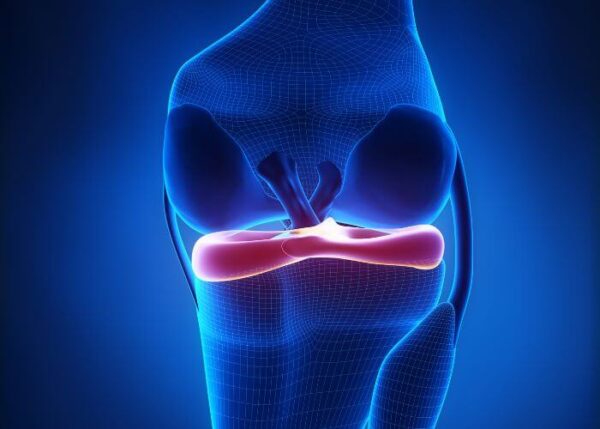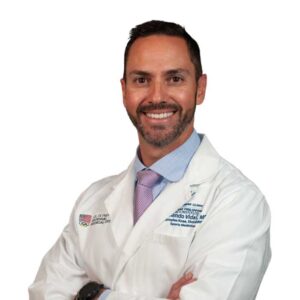What is a meniscus?
The meniscus in the knee acts as a shock absorber between the bones, helping the joint glide easily and without pain. Each knee has two menisci which are wedge-shaped fibrocartilage discs. They are tough and rubbery, providing structural integrity to the knee joint when it is under tension or torsion (twisting). Dr. Armando Vidal, orthopedic knee specialist, serving patients in Vail, Aspen and the surrounding Denver, Colorado communities understands the meniscus and it is very important function in the knee. He specializes in meniscal injuries and meniscal preservation.

What is a meniscal injury?
There are different injuries that can occur to the meniscus of the knee. Dr. Vidal specializes in meniscal injuries, some of which are:
What are the symptoms of a meniscal injury?
General symptoms for most meniscal injuries are similar in nature and can include:
- Pain, often sudden and severe in trauma; gradual and constant if a wear-n-tear injury occurs
- Swelling
- A popping sensation or sound at the time of injury
- Knee stiffness and limited range of motion
- Locking or catching of the knee
- Knee instability – the feeling of the knee “giving away”
How have meniscus treatments changed?
Seven decades ago, the meniscus was felt to be a vestigial structure and unnecessary. Therefore, in this era, removing the meniscus from the knee joint was the sole technique for treating sports-related injuries. However, it was discovered that this resulted in the deterioration of articular cartilage (the cartilage on the ends of the bones) and contributed to the development of arthritis. Currently, Dr. Vidal’s prevailing treatment is to maintain the intact tissue of the meniscus whenever possible with repair and/or regeneration. He understands the anatomical and functional utility of the knee meniscus and has helped develop new and innovative treatment approaches.
What causes a meniscus injury?
Typically twisting or squatting activities can result in tearing of the meniscus. The meniscus is exposed to a variety of forces and loads. In younger patients, the meniscal tissue is very elastic and durable and therefore tears usually occur only as a result of a traumatic or acute injury. However, as we age, the meniscus starts to degenerate, and the tissue becomes more susceptible to damage. As a result, meniscal tears in adults can occur with less energy and in less acute settings.
How are meniscal injuries diagnosed?
An MRI scan, along with a physical exam can diagnose the vast majority of meniscal injuries. However, some meniscal tears are difficult to diagnose, especially those at the periphery of the knee. These injuries require an experienced orthopedic knee specialist for an accurate diagnosis. For patients in Vail, Aspen and the surrounding Denver Colorado communities, Dr. Vidal will discuss symptoms, examine the injured knee and accurately diagnose the injury.
Meniscus Restoration Specialist
Are you an active individual experiencing sudden knee pain after performing rapid twists or turns? If so, you may have experienced a damaged or torn meniscus. There are many different types of meniscal injuries, so it is important to seek out a professional if you are experiencing knee pain. Complex knee specialist, Doctor Armando Vidal provides diagnosis as well as surgical and non-surgical treatment for patients in Vail, Aspen, and the surrounding Denver, Colorado communities who have experienced damage to their meniscus. Contact Dr. Vidal’s team today!

Locations
180 S Frontage Rd W
Vail, CO 81657
226 Lusher Court
Ste 101
Frisco, CO 80443
322 Beard Creek Road
Edwards, CO 81632


